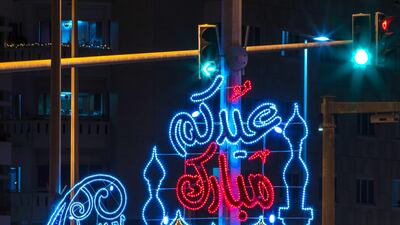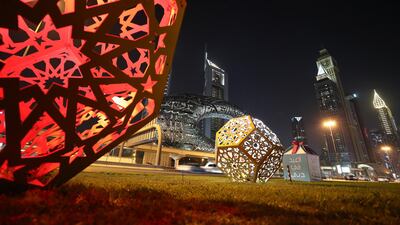Health experts warned the faithful against overindulging after fasting during Ramadan.
Their comments came on the eve of Eid Al Fitr, a time typically associated with celebration and large feasts.
Muslims are urged to make sure they eat the right food in the right amount as they return to normal diets.
“It’s important not to overeat during Eid, especially if you have been fasting for the previous month,” said Ilse Onderweegs, a nutritionist at ICO Healthy Living in Dubai.
“It’s important to eat breakfast, lunch and dinner, but it’s equally important to make sure you stick to proper wholesome food and don’t eat a lot of processed and sugary foods.
“People who were eating healthily before Ramadan should go back to that, and I would recommend that anyone who was fasting should take it slowly.”
She advised people to stick to natural foods, such as fruit, vegetables and legumes.
“There is often a temptation to feast during Eid, which is understandable, but it’s vital to make sure you are not overdoing it,” she said.
“If you’re eating meat, I would advise going for grass-fed produce rather than grain-fed because there are more nutrients.”

It was confirmed this week that Eid Al Fitr would begin on Thursday, May 13.
While activities will be scaled back because of the Covid-19 pandemic, it is still expected to be a time of great celebration with family and friends.
Controlled and disciplined
Another health expert said it was important to reintroduce foods in a controlled and disciplined manner after fasting.
"Returning to a normal diet after Ramadan may be a shock to your body and could trigger undesirable side effects if not managed properly," said Dr Farhana bin Lootah, an internal medicine specialist at Mubadala Health's Imperial College London Diabetes Centre in Abu Dhabi.
“Fasting leads to several changes in your body. For example, digestive enzyme production is reduced and the protective layer of your stomach may be temporarily diminished, which can lead to irritation if your stomach becomes overburdened.”

She said it was crucial the body was given time to readjust to normal digestion and metabolism.
“If you overload your digestive system by overindulging post-Ramadan, you risk experiencing discomfort such as stomach cramping, heartburn and nausea,” she said.
“Practise the 80/20 rule: that is, eat slowly and only until you feel 80 per cent full.
“By eating slowly, you are allowing your brain to register the food in your stomach, which in turn leads to increased satiety levels and prevents over-consumption of food.”
Sleeping patterns
It was not only digestion issues that people had to be aware of when returning to a normal routine after fasting.
Sleeping patterns are often disturbed when fasting, which means it is vital to get enough sleep to cope with a return to increased working hours during the day, said Dr Danish Anis, general practitioner with Aster Clinic in Dubai.
“Our daily routine and sleeping habits in Ramadan are quite different and unique compared with the rest of the year,” he said.
“Sleep timings most importantly get changed to accommodate suhoor arrangements at night, school and office runs during the day and for iftar preparations.
“Therefore, once Ramadan is over it's critically important to go back to the usual sleeping routine as working hours and workload is increased.”
He also recommended getting back into the habit of going to bed early to ensure your body adjusts to Ramadan being over.
“Going to bed on time should be made a top priority until it becomes a habit,” he said.
“Getting up on time is equally critical, and not giving yourself time for naps during the day will also help you to fall asleep on time at night.”









